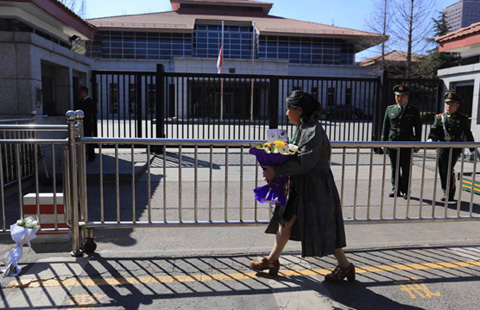Toronto debuts N. American yuan trading
Updated: 2015-03-24 12:42
By Paul Welitzkin in New York(China Daily USA)
|
||||||||
The first clearinghouse in North America for China's yuan currency, also known as the renminbi, is officially opened following ceremonies on Monday in Toronto.
The center reduces transaction costs for Canadian firms doing business in China because it is no longer necessary for the companies to buy US dollars first to change into yuan. A recent study by the Canadian Chamber of Commerce estimated that allowing direct trade in the yuan could save Canadian firms up to C$6.2 billion (US$4.96 billion) over 10 years.
China is now the largest trading nation in the world, and the renminbi is the fifth-largest global currency in terms of value of payments. Toronto joins London, Frankfurt, Luxembourg, Hong Kong, Singapore, Sydney and Taiwan as officially recognized trading hubs.
Michael de Jong, the finance minister of British Columbia, said the hub will support the increased use of the yuan in trade, commerce and investment between Canada and China.
"Having a Canadian renminbi hub will enable BC businesses to take advantage of the benefits that flow from doing RMB-denominated transactions. This is an exciting opportunity for British Columbia and we are dedicated to ensuring the success of this pan-Canadian initiative," he said in a statement.
"Today is a big day; I'm so happy to participate in this grand inauguration ceremony of the RMB Clearing Centre," China's Ambassador to Canada Luo Zhaohui said. "China has attached great importance to our bilateral financial cooperation, and we have learned a lot from Canada. The RMB Clearing Centre in Toronto marks another important step forward. I hope our next step is on the establishment of the Asian Infrastructure Investment Bank."
Gu Shu, senior executive vice- president ofthe Industrial and Commercial Bank of China, said that there are "geographic and multiple time-zone advantages in support of the 24/7RMB clearing system". Gu said it also would "shore up weak spots, and boost the real economy between Canada and China".
A 2011 census found that nearly 30 percent of Vancouver residents are Chinese and British Columbia sends more than 40 percent of its exports to Asia, according to the Asia Pacific Foundation of Canada.
"There will be no provincial barriers for this center. A business or bank in Quebec and Manitoba will be able to take advantage of this hub," Gordon Houlden, director of the China Institute at the University of Alberta in Edmonton, told China Daily. "In addition to Toronto, there will be an operations unit in Vancouver. This will help with the time difference between the provinces in the eastern and western time zones."
Wendy Dobson, co-director of the Rotman School's Institute for International Business at the University of Toronto and a former deputy minister of finance for Canada, wrote in an e-mail that the trading hub can be accessed by firms across the country using electronic transactions with permitted banks.
China named the Canadian subsidiary of the Industrial and Commercial Bank of China Ltd in Toronto to clear and settle renminbi transactions between Canada and China directly in China's payments system.
"With the valuable opportunity to serve as the only renminbi off shore center in North America, we are confi dent that we can develop better in Canada, and eventually be recognized as a major player by our customers and other players in the banking industry," William Zhu, the bank's president and CEO said in January.
In 2013, the provincial government of British Columbia became the first foreign government to issue an off shore bond denominated in the yuan.
paulwelitzkin@chinadailyusa.com
(China Daily USA 03/24/2015 page1)

 Dramatic changes for Chinese miners in the last 30 years
Dramatic changes for Chinese miners in the last 30 years
 Top 10 young Chinese entrepreneurs defining the future
Top 10 young Chinese entrepreneurs defining the future
 Singapore Embassy in Beijing mourns Lee Kuan Yew
Singapore Embassy in Beijing mourns Lee Kuan Yew
 China joins legendary flower show
China joins legendary flower show
 Monks perform tea-picking ritual in Hangzhou
Monks perform tea-picking ritual in Hangzhou
 Singapore founding father Lee Kuan Yew
Singapore founding father Lee Kuan Yew
 5 things you may not know about the Spring Equinox
5 things you may not know about the Spring Equinox
 Solar eclipse wows viewers
Solar eclipse wows viewers
Most Viewed
Editor's Picks

|

|

|

|

|

|
Today's Top News
Students humbled by trip to China
Antitrust policy 'treats
all fairly'
Lee remembered as 'old friend' of Chinese people
Huawei plans big push to sell smart devices in US
Texas Republican Cruz announces presidential bid
Fictional TV presidents more popular than Obama - poll
Beijing artist gives back to opera
Kites of Asia soar at Smithsonian
US Weekly

|

|







